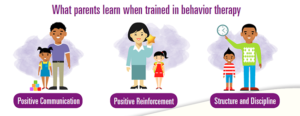Only 1 in 2 young children diagnosed with ADHD are receiving psychological services, which may include the recommended first steps of behavioral therapy through parent training, according to the CDC Vital Signs report released today. Behavioral therapy has been shown to improve the symptoms of ADHD in young children and can be as effective as medication.
The Vital Signs report urges healthcare providers to help improve the number of young children receiving the recommended behavioral treatment by referring the parents of their young patients, 2–5 years old, to training in behavioral therapy before prescribing medication. CDC researchers report that approximately 75 percent of young children being treated for ADHD received medicine, and only about half received any form of psychological services, which might have included behavior therapy. The American Academy of Pediatrics recommends healthcare providers refer parents to training in behavior therapy before prescribing medicine to a young child.
According to the CDC, of the 6 million children (ages 4 – 17) diagnosed with ADHD in the United States, 2 million were diagnosed before the age of 6. Studies show that children diagnosed at a young age tend to have the most severe symptoms.
The report looks at healthcare claims data from at least 5 million young children (2–5 years of age) insured by Medicaid (2008–2011) and about 1 million young children insured through employer-sponsored insurance (ESI) (2008–2014). In both groups, just over 75 percent of young children diagnosed received ADHD medicine. Only 54 percent of young children with Medicaid and 45 percent of young children with ESI (2011) received any form of psychological services annually, which might have included parent training in behavior therapy. The percentage of children with ADHD receiving psychological services has not increased over time.
“There is clear evidence based on a plethora of controlled studies that behavioral parent training (BPT) should be the first choice for treating ADHD in young children,” says George DuPaul, PhD, a former CHADD Professional Advisory Board member and professor of school psychology at Lehigh University. “When BPT is implemented consistently, it can lead to greater parent understanding of behavioral principles, increased use of positive parenting strategies, enhanced parent-child relationships, improvement in child behavior, and possibly delayed initiation of pharmacotherapy.”
ADHD is a biological condition, but parents can play an important role in treating ADHD for their young children. Healthcare providers should talk with parents about the benefits of behavioral treatment as the first step in addressing ADHD symptoms for their child. In this approach, a behavioral therapist teaches parents how to provide positive attention and set behavioral rules for their child. Parents then go home and practice those new techniques before returning to talk about what works for their child and family and what didn’t.
“Parents of young children with ADHD may need support, and behavior therapy is an important first step,” says Anne Schuchat, MD (RADM, USPHS), the Principal Deputy Director of the CDC. “It has been shown to be as effective as medicine, but without the risk of side effects. We are still learning about the potential of unintended effects of long-term use of ADHD medicine on young children. Until we know more, the recommendation is to first refer parents of children under 6 years of age with ADHD for training in behavior therapy before prescribing medicine.
“The bottom line is we know parents want to do what is best for their children,” she says. “Behavioral therapy has been shown to help improve the symptoms of ADHD in young children.”
The Vital Signs report calls for doctors, nurses, and allied health professionals who treat young children with ADHD to support parents by explaining the benefits of behavior therapy and referring parents for training in behavior therapy. This support includes following the guidelines on young childhood ADHD by the American Academy of Pediatrics and American Academy of Child and Adolescent Psychiatry for diagnosing and treating ADHD in young children.
Healthcare providers for young children are encouraged to seek out and learn more about parent training providers in their communities and to refer parents of young children with ADHD for training in behavior therapy. Providers and parents can visit Parent Training in Behavior Management for ADHD at to find therapists who train parents in behavioral therapy.
“It’s encouraging to see the CDC not only emphasize the importance of BPT as a primary treatment for young children with ADHD, but also to underscore the need for greater availability of trained therapists to provide this critical service,” Dr. DuPaul says. “Hopefully the mental health community can be responsive to this important call to action.”
For some young children, medication may still be necessary after behavioral therapy and parent training has been implemented. Adding medication as a support to behavioral therapy can be helpful at that point.
“Many families will benefit from behavior therapy. However, in some cases medicine may be appropriate,” says Georgina Peacock, MD, director of the Division of Human Development and Disability in CDC’s National Center on Birth Defects and Developmental Disabilities. “When healthcare providers and families know the benefits and risks of all available treatments, they are best prepared to make the most appropriate treatment choice for young children with ADHD.”
For more information on ADHD in young children and behavioral treatment programs, visit Preschoolers and ADHD.


